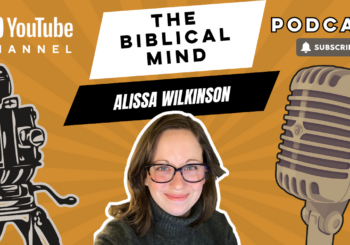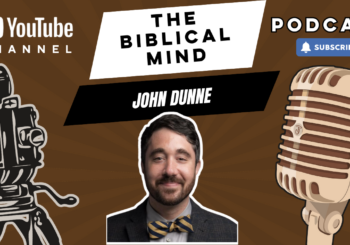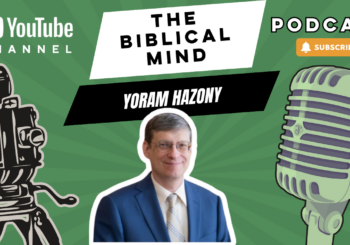Work, Reward, and the Wisdom of Proverbs in a Complicated World
During my teenage years, almost daily, my mom and I would read a proverb in the morning. I thank God for my mom’s effort to make me familiar with biblical values. However, maybe it was this practice that made reading the book of Proverbs difficult for me. When each proverb is read in isolation, the proverbs might give the impression that reality, including God himself, is mechanistic and predictable.
Today, after being involved for more than a decade with the lives of children, teenagers, and families living in poverty and deeply affected by violence, I know that reality is complex, unfair in many respects. I also know that God works in surprising ways, even using unexpected situations and people to communicate his grace and goodness, his own life, to all of us, especially those in greater need.
Enjoying this article? Read more from The Biblical Mind.
I now bring this new perspective when I read the book of Proverbs, considering what it might say concerning human flourishing in a profoundly unequal world. How can I read, “Keep awake and you will have food to spare” (Prov 20:13b), while the children of a single mom working 12 hours per day to collect recyclables are hungry? Perhaps the real wisdom of the book of Proverbs is not found in its individual aphorisms.
The wisdom of Proverbs doesn’t lie in each isolated assertion and observation, but in the complex relations among them. Readers need a trained eye to see these relations. Sometimes, it is necessary to consider and compare different proverbs throughout the whole book. But sometimes proverbs in the same chapter bear informative relations to each other. These cases are important, because they demonstrate how to understand the whole book of Proverbs.
My own experiences have illuminated a very interesting example in Proverbs 11:23–31. In this sequence, several assertions and observations could be read in isolation, creating a mechanical and predictable view of reality. When read as interrelated composition, however, we find a complex view about good and evil, wealth and poverty, and how God’s reward is given to righteous and unrighteous people.
Understanding the Wisdom of Proverbs
This is my translation of Proverbs 11:23–31:
The desire of the righteous, only what is good; the hope of the wicked, wrath.
There is one who spends and gains even more; and another who saves honestly just to be in need.
The blessed life is made abundant; the one who fills up the cup of another will have his cup filled up too. Who withholds production, the nation will curse; but blessing is over the head of the distributor.
The one seeking goodness, pursues goodwill; but the one seeking evil, it will meet him. Who trusts his wealth will fall, but the righteous, like foliage, will flourish. The one troubling his family will inherit the wind; the fool is a slave to the wise.
The fruit of the righteous is a tree of life, and the wise captivates lives.
Look! The righteous receives what he deserves on earth; even more the wicked sinner.
The book of Proverbs offers wisdom derived from the experience of human relationships: humanity in relation to creation, humanity in relation to God, and individuals in relation to others in community. Its aphorisms only work, so to speak, when understood as maximic language, i.e., in the context of lived experience and performance. Dru Johnson uses this concept from Michael Polanyi in saying that maximic language has no substantive meaning, but rather is intended to guide or redirect towards a specific way of knowing and acting in reality.1Dru Johnson, Biblical Philosophy: A Hebraic Approach to the Old and New Testaments (Cambridge: Cambridge University Press, 2021), 241, 255. Johnson even demonstrates through some examples in the book of Proverbs how the maximic language works in the Hebrew Bible. Maximic language is about the acquisition of life skills. So, the meaning of three red peppers as an index of really spice food is obvious in the context of a restaurant menu and is intended to help you choose your meal according to your expectations. But this meaning is not an affirmation about reality independent of a very specific context and purpose. When we approach Proverbs from the perspective that its wisdom emerges from an insightful vision of reality in the specific context of human experience, its complexity blooms.
On the positive side, Proverbs 11:23–31 characterizes the righteous person as someone who desires what is good. This text portrays goodness very practically through actions, relationships, resources, and food. Curiously, according to the text, the one who spends gets richer, but the one who saves honestly ends up with nothing. Considering life in community, this assertion, which seems to be contrary to all we know about modern Western economics, actually makes lots of sense. Here, to spend, in this composition of proverbs, means “to fill up the cup of another,” “to distribute production,” “to pursue goodwill,” “to have fruit like the tree of life.” Therefore, this is not selfish spending to satisfy consumerist desires. Much to the contrary, these are generous outlays deliberately aimed at the common good. From our perspective, and with possible application for our context, we could speak of wise investment. Spending for the good of the community is the best “insurance” for the well-being of individuals.
On the negative side, the text asserts counterintuitively that the one who saves honestly is in need. Here again, we cannot start with our Western, individualistic, consumerist perspective. In Proverbs’ wise perspective of human life, particularly life in community, the one who saves honestly is someone who “withholds production,” “trust in his wealth,” and “troubles his family.” This is, then, a foolish investment, one that only considers short-term and individualistic well-being, and destroys the good of the community. As we will see, the destruction of the community will end in the destruction of the individual.
Part of how the text defines the righteous and the wicked, the wise and the fool, the blessed life and the cursed life, is through imagery from nature. Verse 28 says that the one who trusts his wealth will fall, but the righteous, like foliage, will flourish. Verse 30 expands this image saying that the fruit of the righteous is a tree of life and the wise captivates lives, meaning that the righteous attracts people around him. Such imagery reveals the relational view of Proverbs and how God acts through creation. Trusting wealth makes one withhold resources and isolate himself from community; even worse, it makes him the target of other people’s wrath. An isolated tree falls much more easily, like someone who troubled his family by consuming their resources disproportionally or failing to contribute productively, and then inherits the wind. On the other side, the one who spends, invests in the well-being of others and the community, becomes a tree of life, like the one in Genesis 1. This tree is what sustains life, and hence it attracts others to itself. Unlike the wicked—the isolated tree that falls—the wise helps fertilize the soil around it, standing firm because it is surrounded by other trees.
Complex Wisdom for a Complicated World
The construction of this sequence of proverbs sheds light on the wisdom of work and reward. On this topic, Proverbs is often understood to advance meritocracy. Its aphorisms are used to accuse poor people, as if their poverty can only be the result of laziness. Even worse, poverty itself is sometimes mechanistically understood as the divine and just reward for sin. This perspective changes completely if we, instead of isolating Proverbs’ aphorisms, interpret them in light of each other.
Instead of a weapon of accusation or judgment, the text at hand exhorts and instructs concerning the dynamics of work and reward in the context of life in community. God blesses and curses in the realm of human relationships. Cursing happens in social relations that ignore the community’s well-being, and blessing happens in a social relationship of reciprocal goodness. The best example is in verse 35: “The blessed life is made abundant; the one who fills up the cup of another will have his cup filled up too.” Well, who will fill up the cup of the one who filled the cup of another? On the one hand, the language of blessing, and the verb in the passive voice suggests that God will fill his cup and reward him. On the other hand, the context of community behind the text and the botanical imagery suggest that someone in the community, when the need arises, will reciprocate the favor. Divine reward comes through life in community. In the case of the cursing, it is the consequence of a life that destroys the community, which will end up destroying the life of the greedy and selfish individual, one way or another. That’s why the conclusion of the text is: “Look! The righteous receives what he deserves on earth; even more the wicked sinner.”
However, we cannot soundly reverse these proverbs’ logic. That people reap curses does not entail the converse: that all suffering is the result of the sufferer’s life choices. We cannot see someone in poverty, as a fallen and dry tree, and infer that this person must be a fool reaping the fruits of her own foolishness. The experience of life in society, with all its complexities, invalidates this logic. In this case, the wisdom of Proverbs becomes foolish or, even worse, unjust and oppressive. In the case of poverty, the logic of these proverbs is very different. Instead of accusing those in poverty, the wisdom sheds light on what kind of society produces it. It seems to me that the existence of poverty is the divine reward against a wicked and sinful society that “saves honestly,” but is in need, because the tree that grows alone is destined to fall. The true wisdom of these proverbs is that work aimed at generosity and investment creates a more flourishing community, which, then, will protect individuals from experiencing need and poverty. In such community we find the tree of life, blessing, and God’s gift.
If we try to make sense of life from snippets of our experience, it will be hard to discern or construe something meaningful. We need a broader and more complex perspective. Washing my children’s dirty feet every night or playing hide-and-seek around the house are meaningful experiences that help form my relationship with my children. But if I isolate these experiences from all the others, they don’t really define who I am as a father, much less who I am as a person and the meaning of my life. The book of Proverbs offers various insights about the human experience in this world. These insights are interesting in themselves, but apart from all other insights found in the book, and, maybe even more importantly, apart from real life experiences, they mean very little. Each proverb must be tested with and against other proverbs. They must also be tested with and against the stories of real people in the real world. Without this effort, we will not be formed by the wisdom of Proverbs, but will only use it foolishly.
End Notes
1. Dru Johnson, Biblical Philosophy: A Hebraic Approach to the Old and New Testaments (Cambridge: Cambridge University Press, 2021), 241, 255. Johnson even demonstrates through some examples in the book of Proverbs how the maximic language works in the Hebrew Bible.
Did you enjoy this article? Check out The Biblical Mind podcast.
Image created by Rubner Durais





